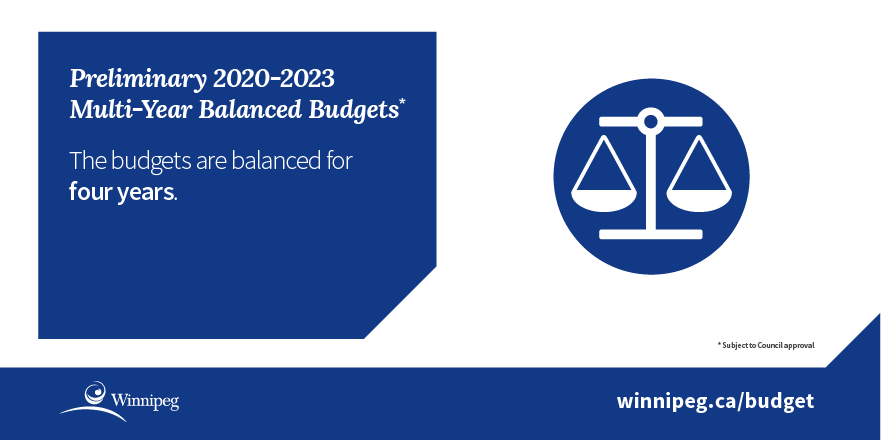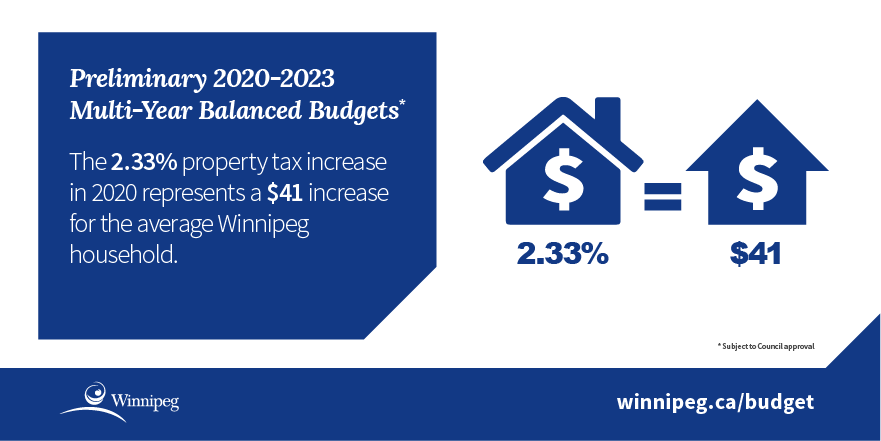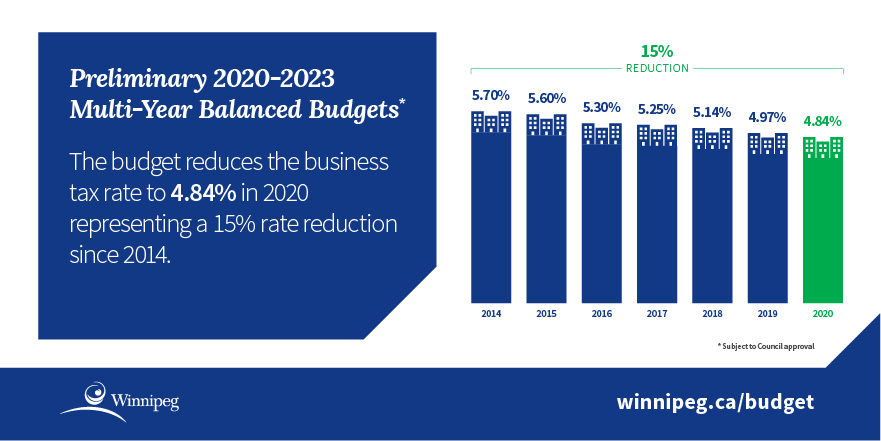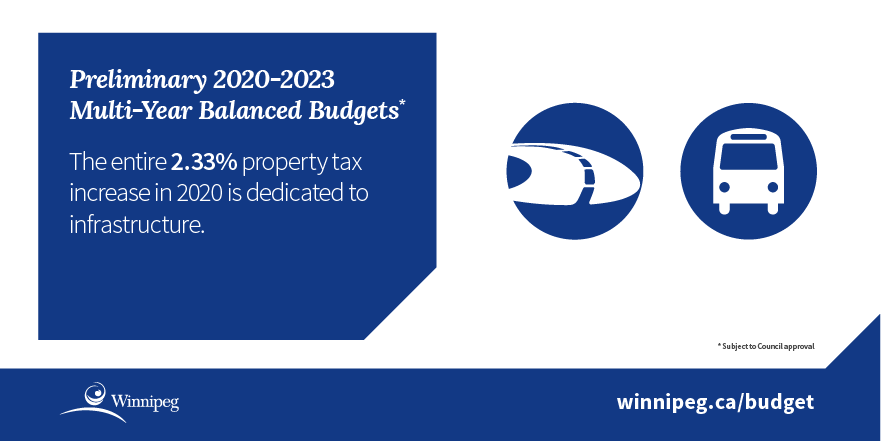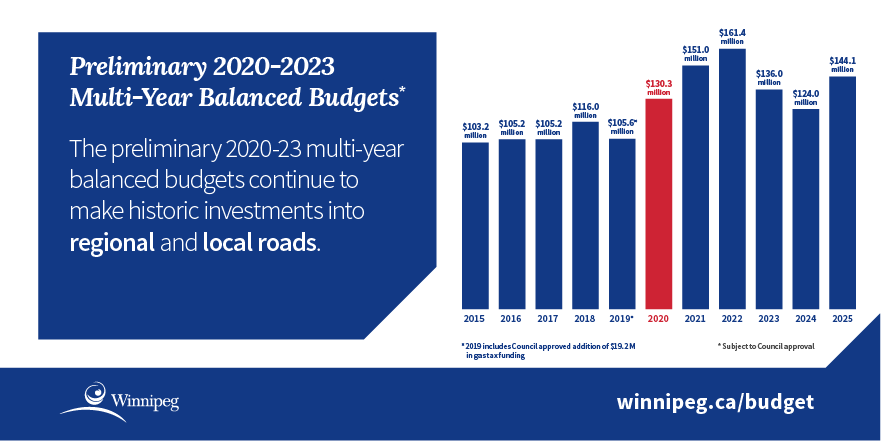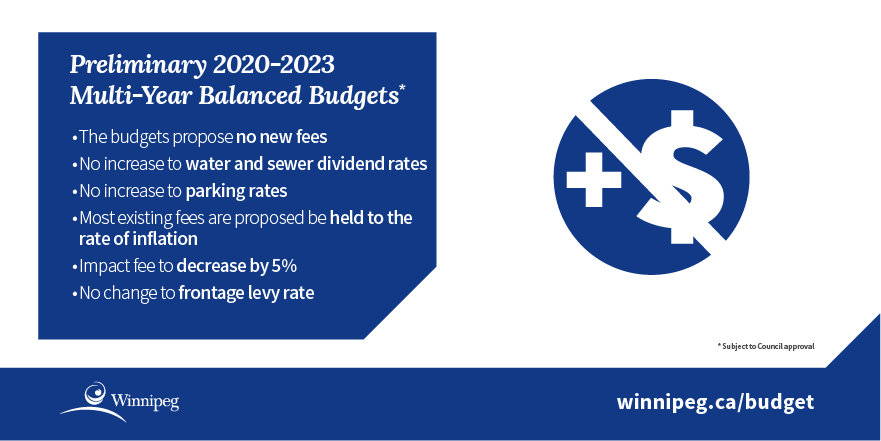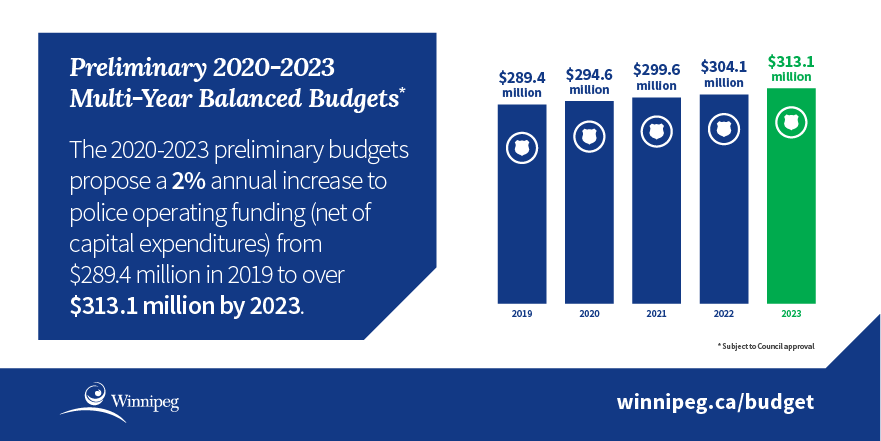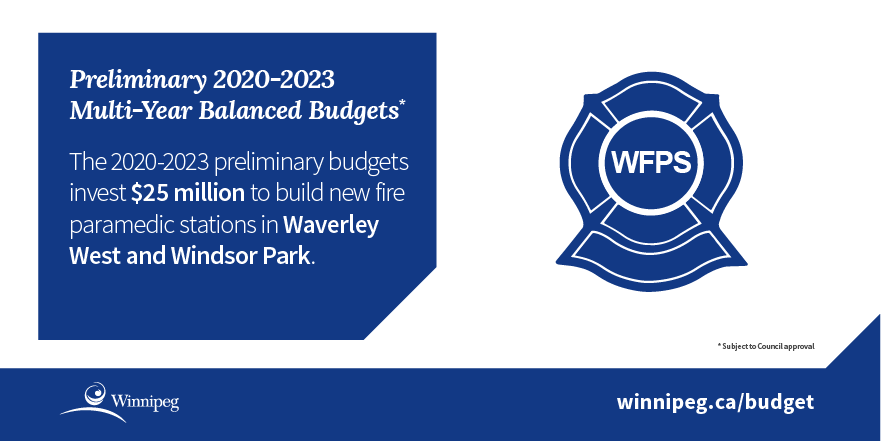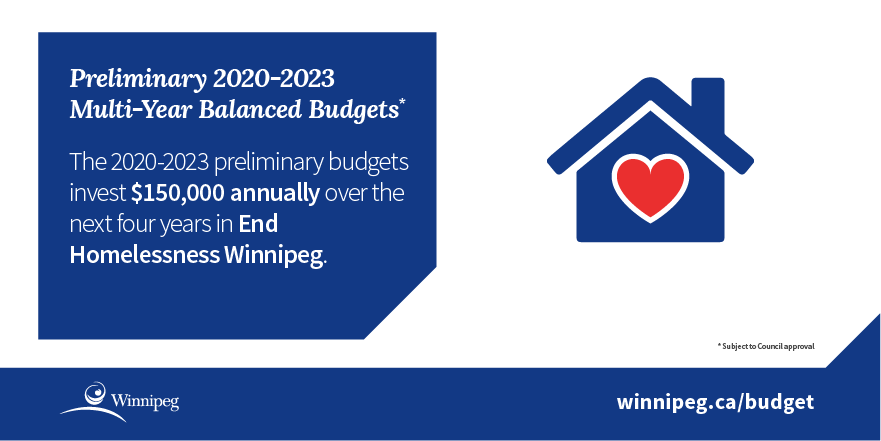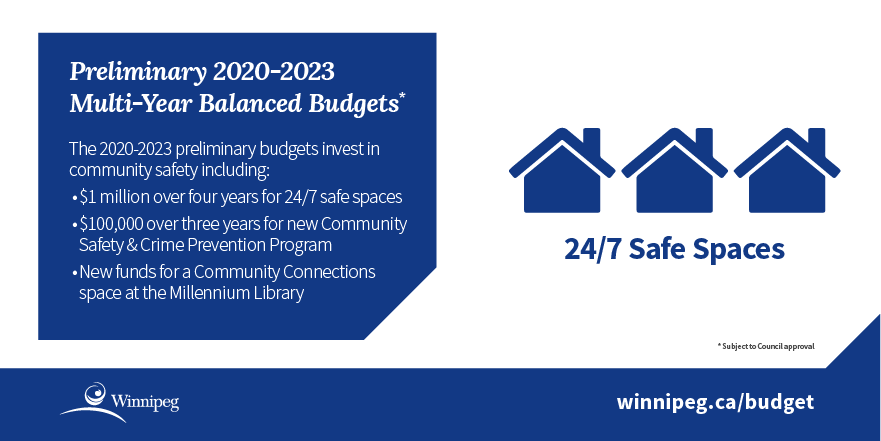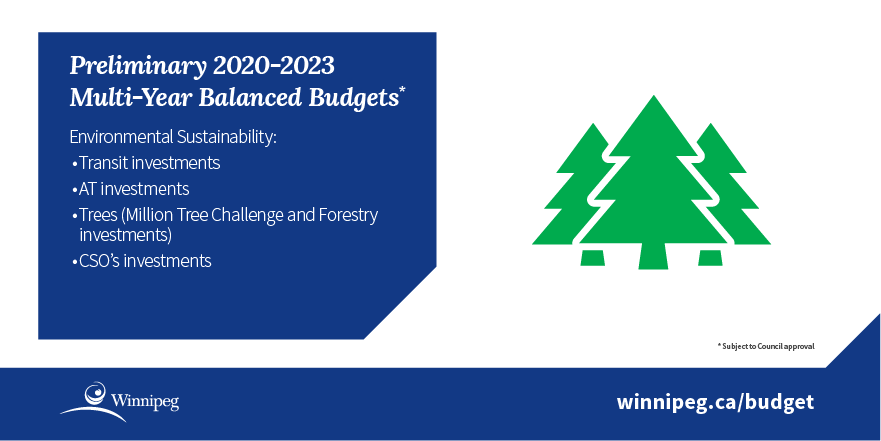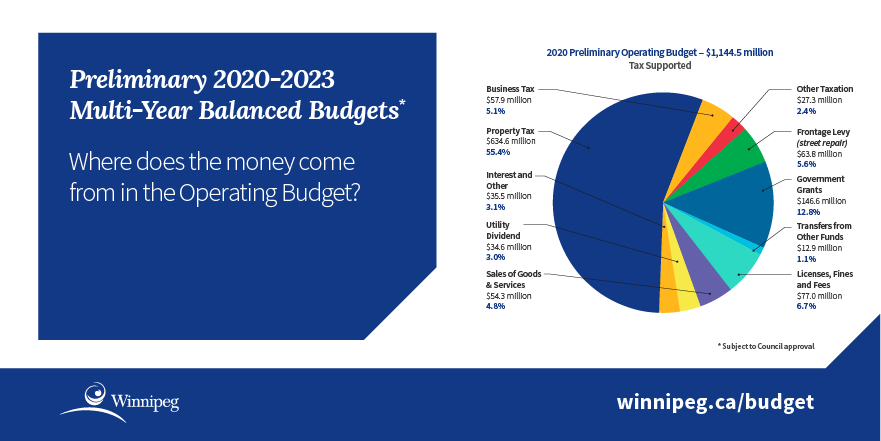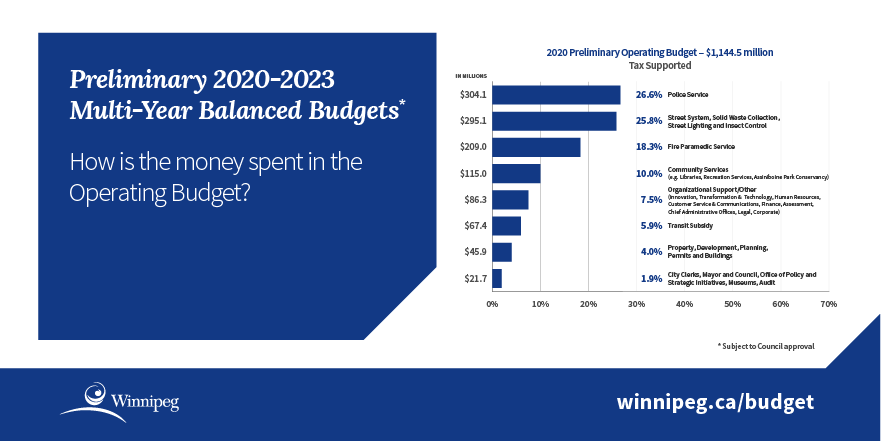Multi-year budget 2020 – 2023
2020 Letter from the Mayor and Chairperson of the Standing Policy Committee on Finance
Introduction
We are very pleased to table the preliminary 2020-2023 multi-year balanced operating and capital budgets.
2020 is a significant year for the City of Winnipeg. Unlike previous years when City budgets were balanced one year at a time, this year, we are presenting preliminary balanced operating and capital budgets for the next four years.
The multi-year balanced budget process provides Council with an opportunity to make adjustments to the budgets each year as part of an annual review process. Council will still be required to vote on the annual operating and capital budgets each year in accordance with The City of Winnipeg Charter.
Multi-year balanced budgeting allows us to take a longer term view of Winnipeg’s needs and better plan for stable service delivery and infrastructure investment.
The preliminary multi-year balanced budgets will also provide a blueprint for transformative change in the way we deliver key services and invest in infrastructure while providing certainty and predictability for ratepayers.
Key priorities for the multi-year balanced budgets include investment in transit, community safety, community services, roads, fire protection, trees as well as controlling expenses and driving efficiencies. The multi-year balanced budget process will also chart a course forward to review our building asset footprint, repurpose City owned golf lands, reduce the number of City owned and leased fleet vehicles over time, develop a wading pool and splash pad strategy, and consider a multi-year funding formula for the Winnipeg Police Service.
Winnipeg’s population is on track to continue to grow steadily and strongly over the coming decades. It is critical that we manage and support this growth by investing in the right infrastructure and services at the right time so these investments are in place when we need them.
The new multi-year balanced budget process is more open and transparent than previous annual budget processes and has provided greater opportunity for active involvement of all members of Council community organizations, the public and the Public Service. The process began four months ahead of today’s tabling of the preliminary multi-year balanced budgets and today marks the continuation of this open and transparent review process.
As other levels of government struggle to balance their budgets one year at a time, we are presenting balanced operating budgets for each of the next four consecutive years.
Despite flat operating funding support from the provincial government, the preliminary budgets are balanced without significant cuts to City services while capping annual dedicated property tax increases at 2.33 percent for investment in road renewal and financing the Southwest Rapid Transitway (SWT).
Overall, we believe the preliminary 2020-2023 multi-year balanced budgets present a responsible plan that strikes the right balance between fiscal and environmental sustainability while making investments in key services and infrastructure that will build our growing City for the future.
Operating Revenues and Expenses
At the start of the multi-year balanced budget process, we were facing an operating deficit of $89.6 million in the tax-supported budget for 2020 that was projected to increase to $174.9 million by 2023.
In October 2019, the Executive Policy Committee endorsed a framework to balance the budgets over the next four years. This framework included stringent operating expenditure targets for all departments and caps on capital expenditures.
In November 2019, City Departments came forward with approximately $147 million of tax-supported operating expenditure reduction options over the next four years to assist in bringing the budgets into balance.
Many of the operating reduction options involved the closure of pools, libraries, fire halls and other civic facilities, along with eliminating important City services.
The preliminary multi-year balanced budgets do not include any of the proposed closures of existing City facilities or any other significant reductions to important City services, such as discontinuing multi-family garbage collection or changes to street lighting.
The preliminary multi-year balanced budgets do, however, reflect approximately $118 million of operating expenditure reductions and includes many of the options proposed by the Public Service, as well as some additional expenditure reductions.
Additional expenditure reductions that are reflected in the total of $118 million noted above, include a proposal for the strategic use of debt instead of cash to fund bus purchases and a proposal to discontinue the U Pass program once the agreements with the universities expire in May 2020.
A further expenditure reduction measure included in the preliminary multi-year balanced budgets is a proposal for a 10 percent reduction to all annual grants starting in 2020, excluding grants to organizations that have multi-year agreements with the City. Organizations providing services on behalf of the City through community partnership arrangements will also be excluded from this 10% grant reduction.
With difficult but necessary decisions like these, we have been able to meet the expenditure targets for a majority of City departments, as prescribed by the Executive Policy Committee last year and balance the budgets for the next 4 years. Also assisting in balancing the budgets is slightly higher property tax revenue and investment income than was originally projected at the start of the multi year balanced budget process.
Before capital-related expenses, the tax-supported operating budget will increase by an average of 1.5 percent per year over the next four years, which is among the smallest increases in over a decade. After capital related expenses are included, the next four years would see an average annual increase of 2.6 percent. This is lower than the average annual projected rate of growth in the consumer price index and population growth over this period of 3.37 percent.
Winnipeg continues to have among the lowest operating costs per capita and the lowest property taxes of all major cities in Canada.
The preliminary multi-year balanced budgets propose to maintain Winnipeg’s competitive position in this regard by capping property tax increases at 2.33 percent per year for the next four years with the entire increase dedicated to Winnipeg’s infrastructure requirements.
Two percent of the proposed 2.33 percent annual increase is dedicated to rebuilding our roads and 0.33 percent is dedicated to financing the SWT. This means the average homeowner will pay an additional $41.00 in property taxes in 2020.
To continue powering the economy and encouraging investment, the business tax rate is being reduced from 4.97 percent to 4.84 percent and the business tax threshold will increase from $33,900 to $35,700 in 2020. This will ensure that approximately one half of Winnipeg’s businesses will continue to be exempt from this tax.
The preliminary multi-year balanced budgets propose no changes to the current frontage levy rate or the water and sewer dividend rate. There are no new fees or charges included in the preliminary multi-year balanced budgets.
Increases to most remaining fees and charges will be limited to the rate of inflation at approximately two percent over the next four years, with the notable exception of water and sewer rates which will increase higher than the rate of inflation to fund provincially mandated capital upgrades. The waste diversion fee will increase by three percent from $63.00/year to $65.00/year in 2020 to reflect the cost of the City’s recycling contract. The Impact Fee will decrease by five percent in 2020 and parking rates will remain frozen.
Transit
Executive Policy Committee set an annual operating expenditure growth target of 2 percent per year for Transit for the multi-year balanced budget.
At the outset of the multi-year balanced budget process, Transit proposed a total of $52.6 million of operating expenditure reduction options over the next four years to meet its expenditure targets.
The preliminary budgets reject most of the proposed operating expenditure reductions that involve significant service reductions in favour of a plan that will allow Transit to meet its expenditure targets without significantly impacting service while building transit for the future in a fiscally responsible and environmentally sustainable way.
In April 2020, the SWT linking downtown with the University of Manitoba and southwest Winnipeg will be complete and open for service. The SWT was substantially completed ahead of schedule and over $165 million under budget.
The multi-year balanced budgets propose an investment of over $13.1 million over the next four years for a new “spine and feeder” transit service model that will serve the SWT by providing high frequency, reliable, efficient and significantly improved service for passengers who travel to, from and within southwest Winnipeg.
The investment in the new spine and feeder system includes several new Transit routes, changes to existing routes and elimination of some redundant routes. This new service plan will be supported by twenty eight new 60 ft. articulated buses along with seven new rapid transit stations located at various points along Stage 2 of the SWT.
The Winnipeg Transit Master Plan will be presented for Council’s consideration in 2020. This plan will provide a 25 year vision for Transit services and infrastructure that will support a growing city.
Affordability is a key feature of a modern public transit system and Winnipeg continues to have among the lowest transit fares compared to other major Canadian cities. The multi-year balanced budgets take concrete steps towards enhancing transit affordability for those residents that need it the most by implementing Winnipeg’s first low income Transit pass. Starting in 2020, qualifying individuals will be eligible to receive a 30 percent discount on the full adult fare monthly pass with the low income Transit pass. In 2021, this discount will increase to 40 percent followed by 50 percent in 2022.
To further enhance affordability, starting in 2021 children under 12 years of age will be able to ride Transit at no cost.
The multi-year balanced budgets propose significant new investments in Transit Plus, including approximately $1.3 million starting in 2021 to eliminate a barrier that currently requires the origin and destination of a trip to be within 500 meters of an established bus route. Eliminating this barrier is one of the key recommendations of the Ombudsman‘s 2019 report on Transit Plus.
The multi-year balanced budgets also propose a total investment of $2.5 million over the next four years to implement several more of the Ombudsman’s recommendations for Transit Plus which will assist in providing better Transit service to some of our most vulnerable residents.
The preliminary multi-year balanced budgets also reflect approximately $20.5 million of the operating expenditure reductions originally proposed by Transit, including reduced cash contributions to the bus replacement program and discontinuing the free Downtown Spirit service.
The preliminary multi-year balanced budgets also involves the strategic use of debt and retained earnings rather than operating funds to purchase replacement buses, as well as a plan to reduce Transit service on selected low volume routes.
As well, the budgets do not propose a renewal of the U-Pass program once the current agreements with the universities expire in May 2020. However, post-secondary students can still receive a 20 percent discount off the cost of a regular adult fare with the purchase of a Post-Secondary Pass and those students in financial need can now apply for a low income Transit pass.
With all of the measures noted above, Transit’s overall operating budget will increase by an annual average of 2.5 percent over the next four years (before capital related expenses), slightly higher than its target of two percent.
The tax supported subsidy to Transit is projected to increase by 35 percent from $70.5 million in 2019 to $95.5 million in 2023. Despite significant provincial government funding reductions to Transit over the last few years, investment in Transit remains a top priority for us in the multi-year balanced budgets.
Community Safety
Executive Policy Committee set an annual operating expenditure growth target of 2 percent per year for the Winnipeg Police Service (WPS) for the multi-year balanced budgets.
In November 2019, the WPS came forward with a plan to meet their expenditure targets that involved reducing the complement of sworn officers by 34 positions, as well as 25 cadet positions.
At the same time, City Council made the difficult but necessary decision to approve reforms to the Police Pension Plan sustainability for its members and for property taxpayers.
Council’s decision on the police pension reforms allow for approximately $14.7 million in pension savings to be reinvested back into the WPS over the next four years. This will enable the WPS to meet their operating expenditure targets without reducing the complement of sworn officers or cadets, which reflects the recommendations of the Winnipeg Police Board on the multi-year budget in December 2019.
The police pension reforms will also allow for a further $1.5 million in savings each year to be reinvested back into the WPS starting in 2021. These savings can support new investments in police and public safety to be determined by the Chief of Police, in consultation with the Winnipeg Police Board.
Overall, the preliminary 2020-2023 multi-year balanced operating budget proposes historic investments by increasing the operating budget for the WPS by an average of 2 percent annually from $289.4 million in 2019 (before capital related expenses) to over $313 million by 2023, which is the largest share of the City’s tax supported operating budget.
The preliminary 2020-23 multi-year balanced budgets will support continued annual investments of $100,000 for the next 3 years in the new Community Safety and Crime Prevention Program to bolster community-level activities that strengthen local crime prevention and community safety efforts.
The preliminary multi-year balanced budgets will support phase 2 of the Downtown Public Safety Strategy by providing new operating funds for a Community Connections space at the Millennium Library to assist vulnerable and at risk residents make important connections to social services.
Also proposed is a total investment of $1 million over the next four years to support an expansion of 24 hour safe spaces by community agencies, which is a key recommendation of the 2019 Illicit Drug Task Force Report. 24 hour safe spaces offer an overnight, safe environment for vulnerable individuals to rest and to access food, as well as other resources and supports. It is our expectation that Winnipeg’s proposed new investment in 24 hour safe spaces will encourage additional investments from both the federal and provincial governments in this critical service.
The preliminary multi-year balanced budgets also propose renewed investment of $600,000 over the next 4 years for End Homelessness Winnipeg in support of their efforts to address housing needs and extreme weather support services for the most vulnerable in our community.
Community Services
Executive Policy Committee set an annual operating expenditure growth target of 0.5 percent per year for Community Services for the multi-year balanced budget.
At the outset of the multi-year balanced budget process, the Public Service had proposed over $16 million of operating expenditure reduction options in order for Community Services to meet its expenditure targets.
The recommended operating expenditure reduction options involved the closure of pools, libraries, arenas and other civic facilities. Winnipeggers voiced significant concerns at the prospect of these closures and the multi-year balanced budgets reflect community feedback on this matter.
As stated earlier, the preliminary budgets do not propose the permanent closure of any currently open City facilities. Terry Sawchuk arena is currently closed and would remain closed.
The preliminary multi-year balanced budgets accept approximately $4.7 million of the operating expenditure reduction options in Community Services proposed by the Public Service. Currently, 14 of 20 City of Winnipeg libraries are not open on Sundays and the remaining 6 libraries would be brought into line with this standard. Additionally, libraries will not be open past 8 p.m.
The budgets also include a proposal to reduce Leisure Guide programming by 50 percent starting in January 2021. This reduction will involve a review of all Leisure Guide programming, with a view to retaining programming in high needs areas and a focus on children and youth.
Overall, the preliminary 2020-2023 multi-year balanced budgets propose to increase the Community Services operating budget by an average of 1.3 percent annually for the next four years from $105.1 million in 2019 (before capital related expenses) to $110.9 million in 2023, which significantly exceeds the initial target of 0.5 percent approved by Executive Policy Committee, in order to keep key City facilities open.
Road Renewals
The preliminary multi-year balanced budgets propose significant investments for roads.
Over the last 5 years, the City has invested a total of $535.3 million in regional and local road renewals which has resulted in the completion of 686 lane kilometers of road, back lane and side walk renewals.
The preliminary 2020 capital budget and five year capital forecast continues to invest the two percent property tax increase in regional and local road renewal. In 2020, we will invest a total of $130.3 million in local and regional road renewal, the highest annual level of investment in our city’s history.
A projected total of almost $847 million or an average of $141 million per year will be invested in regional and local road renewals over the next 6 years. This compares to an adjusted six year projected investment of $821 million in 2019 or an average of $136.8 million per year.
The projected investment of $847 million over the next 6 years will result in approximately 900 lane kilometers of road, back lane and sidewalk renewals, which is slightly greater than the distance from Winnipeg to Minneapolis. This investment will support important projects across all areas of Winnipeg including:
- Re-construction of Fermor Ave from Lagimodiere to Plessis;
- Re-construction of various downtown streets including Broadway from Osborne to Main St.;
- Re-construction of various segments of Erin St., Wall St. and Sargent Ave.;
- Re-construction of Stafford St., Taylor Avenue and Corydon Ave; and
- Re-construction of Leila Ave from McPhillips to McGregor.
With the investment of over $535.3 million over the last five years combined with the planned investment of $847 million over the next six years, Winnipeg is on track to invest almost $1.4 billion in regional and local street renewals over eleven years.
Winnipeg Fire Paramedic Service
Executive Policy Committee set an annual operating expenditure growth target of 2 percent per year for the Winnipeg Fire Paramedic Service (WFPS) for the multi-year balanced budgets.
At the outset of the multi-year balanced budget process, the Public Service proposed approximately $7.5 million of operating expenditure reduction options over the next four years and $7.8 million of capital expenditure reductions to the WFPS over the next six years.
The preliminary multi-year balanced budgets reject the majority of the proposed operating and capital expenditure reduction options in favour of an investment plan for this critical service area. This plan is built on the recommendations of the recently released report on the WFPS Strategic Direction that provides a 15 year blueprint for investments in the WFPS to support a growing city.
The multi-year balanced budgets propose capital investments of over $25 million to construct 2 new fire paramedic stations beginning in 2022 and 2023. These investments address two of the most immediate capital priorities contained in the WFPS Strategic Direction report.
One of the new stations will be built on the site of the existing Windsor Park station (15) and adjacent city land. This new station will consolidate and replace the existing station in Windsor Park and the St. Boniface station on Marion Street (9). The investment in this station is proposed to begin in 2022. This investment is estimated at $13 million and will be financed primarily through the use of external debt.
The second new station will be built in Waverley West. The investment in this station is proposed to begin in 2023. This investment is estimated at $12.1 million and will be financed partially through the use of external debt of $5.1 million with the balance of $7 million funded from the Impact Fee reserve, recognizing that this new station is required to support a growing area of the city.
The two new fire paramedic stations will each be designed to accommodate an ambulance, subject to Shared Health agreeing to cover its portion of the capital cost of these facilities, recognizing that the City of Winnipeg provides ambulance services on behalf of Shared Health on a contract basis.
It is also expected that the City of Winnipeg will explore options with its neighbouring municipalities in the Winnipeg metropolitan region to help defray the cost of these new fire paramedic stations.
The preliminary multi-year balanced budgets also reflect approximately $2.2 million of the operating expenditure reduction options proposed for WFPS, roughly 30 percent of all of the options proposed by the Public Service. These mostly involve reductions to station maintenance over the next four years.
Overall, the preliminary 2020-2023 multi-year balanced budgets propose to increase the operating budget for the WFPS by an average of 2.1 percent annually for the next four years from $199.5 million in 2019 (before capital related expenses) to $216.8 million in 2023, which slightly exceeds the target increase of two percent approved by Executive Policy Committee.
Tree Protection and Enhancement
In 2019, the Million Tree Challenge was launched to challenge Winnipeggers to help plant 1 million new trees as our population grows towards 1 million people over the coming decades.
Winnipeg’s tree canopy is a great source of pride for our residents and a key asset in the battle against climate change however; our tree canopy is under threat from destructive forces such as the Emerald Ash Borer Beetle and Dutch Elm Disease.
The preliminary multi-year balanced budgets have made the protection and enhancement of our trees a priority by increasing the operating budget for tree planting, pruning and Dutch Elm Disease Control from $11.8 million in 2019 to $12.5 million in 2023, an increase of 6 percent.
The total capital investment in the Urban Forest Enhancement Program and the Reforestation Improvements over the next four years is budgeted to be over $25 million, an increase of almost $10 million or 60 percent from the previous four year capital investment in this area. Budget investments build on previous financial support by Council to Trees Winnipeg who will be leveraged to deploy funds and resources from the private sector to expand the urban canopy.
Six Year Capital Investment Plan
The preliminary 2020-23 multi-year balanced capital budget and five year capital forecast proposes an investment of $2.152 billion, which is a decrease of approximately $154 million from the $2.306 billion in the 2019 budget and five year forecast.
This decrease in capital investment is primarily attributable to a decrease in capital investment from the operating budget (cash to capital) from $360.2 million in last year’s budget and five year forecast to $128 million in this year’s budget and five year forecast. This decrease in cash to capital investment is necessary in order to bring the budgets into balance. The overall decrease in the six year capital investment plan reflects a majority of the capital expenditure reduction options that have been proposed by the Public Service.
External debt for new capital investment for the next six years is projected to be slightly under $133.7 million (excluding Fleet vehicle related debt) which is an increase of $24.3 million from the six year forecast last year of $109.5 million but still well within the City’s self-imposed debt limits. The new debt in the six year capital investment plan will primarily support inter-generational investments in roads and construction of new fire paramedic stations.
$20 million from the Federal Gas Tax top up allocated to Winnipeg last year will be used to support investments in safety, security and accessibility improvements to recreation facilities, a renewal of the St. James Civic Centre and the Bonivital Pool, as well as the Urban Forestry Program.
The six year capital investment plan also includes key infrastructure investments that address environmental sustainability and improve our overall quality of life including:
- An investment of $180 million to reduce the incidence of combined sewer overflows;
- An investment of $23.3 million in Active Transportation Infrastructure;
- An investment of $113.5 million for water main renewals and a further $113 million for sewer main renewals;
- An investment of $132.8 million for the purchase of 180 buses to replace existing buses;
- An investment of $6 million to install new heated bus shelters at various locations throughout the City;
- An investment of $4.2 million to digitalize the Planning, Property & Development permitting process;
- An investment of $14.6 million for ongoing capital improvements at Assiniboine Park; and,
- An investment of $3.0 million towards the renewal of Rainbow Stage in Kildonan Park.
Driving Transformative Change
The preliminary multi-year balanced budgets will chart a course for real, measurable transformative change over the next four years. In 2020, the Public Service will bring forward options to establish a new Transformative Fund (TF) for Council’s consideration that will be funded from the sale of assets deemed surplus to the City’s needs.
The TF will support investments that transform the delivery of City services and reduce the City’s infrastructure deficit with a focus on recreation, public green space as well as protection and enhancement of Winnipeg’s tree canopy.
The Public Service will also present a plan for Council’s consideration early in 2020 to initiate the sale of John Blumberg Golf Course, and report back later in 2020 with a plan to re-purpose up to 30 percent of all City-owned golf lands.
The Public Service will also report back in 2020 with a plan for Council’s consideration to reduce the number of City owned building assets, including those leased to 3rd parties.
The Public Service will also report back in 2020 with a wading pool and splash pad reinvestment strategy for Council’s consideration that will be funded by the TF.
And finally, in preparation for the 2024-2027 multi-year balanced budgets, the Public Service will be working collaboratively with the Winnipeg Police Service (WPS) and Winnipeg Police Board to bring forward options for Council’s consideration on a new multi-year funding formula for the WPS that will provide planning certainty for the City, and a sustainable and predictable funding level for the WPS.
Conclusion
In the coming decades, Winnipeg’s population is expected to chart strong and steady increases as we move toward a city of 1 million people. It is critical that we invest in the services and infrastructure now that we know we will need to support this level of growth in the future.
The preliminary 2020-2023 multi-year balanced budgets present a responsible and sustainable fiscal blueprint to support a growing city.
We must continue to work with our federal and provincial partners to maximize Winnipeg’s share of infrastructure funding for investments that will support our growing city. We must also continue to work with our provincial government to ensure that the City of Winnipeg has a fair say in how provincial infrastructure grants are spent in Manitoba. We will continue to scrutinize all of our expenditures to ensure we are providing certainty and maximum value for taxpayers.
We now invite all residents and members of Council to continue our efforts to finalize the preliminary 2020-2023 multi-year balanced budgets.
Respectfully submitted,
Brian Bowman
MAYOR
Scott Gillingham
CHAIR, Standing Policy Committee on Finance
Multi-Year Budget Preliminary Budget schedule of meetings
Provide feedback on the preliminary budget
If you would like to provide feedback on the preliminary budget in-person, register to appear as a delegation at the appropriate committee.
If you would like to make a written feedback submission for the public record, please submit a copy to City Clerk’s.
The preliminary 2020-2023 multi-year balanced Operating and Capital budgets for the City of Winnipeg will be tabled at a special meeting of Executive Policy Committee on Friday March 6, 2020 – 1:30 p.m.
After the tabling of the budgets on March 6, 2020, the schedule of public meetings to hear delegations and consider the preliminary 2020-2023 Operating and Capital budgets include:
Meeting dates
Wednesday, March 11, 2020 – 9:30 a.m.
Standing Policy Committee on Property and Development, Heritage, and Downtown Development (Special Meeting)
- Planning, Property and Development Preliminary 2020 – 2023 Operating and Capital Budget Presentation
Thursday, March 12, 2020 – 1:00 p.m.
Standing Policy Committee on Infrastructure Renewal and Public Works (Special Meeting)
- Winnipeg Transit Preliminary 2020 – 2023 Operating and Capital Budget Presentation
- Public Works Department and Street Lighting Preliminary 2020 – 2023 Operating and Capital Budget Presentation
Friday, March 13, 2020 – 9:30 a.m.
Standing Policy Committee on Protection, Community Services and Parks (Special Meeting)
- Parks and Open Space Preliminary 2020 – 2023 Operating and Capital Budget Presentation
- Community Services Department Preliminary 2020 – 2023 Operating and Capital Budget Presentation
- Fire Paramedic Service Preliminary 2020 – 2023 Operating and Capital Budget Presentation
Monday, March 16, 2020 – 9:30 a.m.
Standing Policy Committee on Innovation and Economic Development (Special Meeting)
- Innovation, Transformation and Technology Preliminary 2020 – 2023 Operating and Capital Budget Presentation
- PPD Economic Development Division Preliminary 2020 – 2023 Operating and Capital Budget Presentation
- Animal Services SOA Preliminary 2020 – 2023 Operating and Capital Budget Presentation
- Fleet Services SOA Preliminary 2020 – 2023 Operating and Capital Budget Presentation
- Golf Services SOA Preliminary 2020 – 2023 Operating and Capital Budget Presentation
- Winnipeg Parking Authority SOA Preliminary 2020 – 2023 Operating and Capital Budget Presentation
*RESCHEDULED: Monday, March 16, 2020 – 4 p.m.
Winnipeg Police Board (Special Meeting)
*RESCHEDULED – Tuesday, March 17, 2020 – 1:30 p.m.
Standing Policy Committee on Water and Waste, Riverbank Management and the Environment (Special Meeting)
*RESCHEDULED - Wednesday, March 18, 2020 – 9 a.m.
Executive Policy Committee to hear public delegations on budgets (Special Meeting)
*RESCHEDULED - Thursday, March 19, 2020 – 9 a.m.
Executive Policy Committee to table final recommendations (Special Meeting)
*RESCHEDULED - Friday, March 20, 2020 – 9:30 a.m.
Council to consider budget (Special Meeting)
*RESCHEDULED - Saturday, March 21, 2020 – 9:30 a.m.
Regularly scheduled monthly Council meeting
Budget information
Documents
- Preliminary 2020-2023 Multi-Year Balanced Budgets at a Glance
- 2020 Preliminary Budget - Volume 2
- 2020 Preliminary Capital Budget - Volume 3
- 2020 Letter from the Mayor and Chairperson of the Standing Policy Committee on Finance
- Council Presentation – October 18, 2019
- Legislated and Non-Legislated Services
- Recommended Capital Targets
- Volume 1 – Community Trends and Performance Report
- 2019 Citizen Survey
Infographics
Preliminary 2020-2023 Multi-Year Balanced Budgets at a Glance
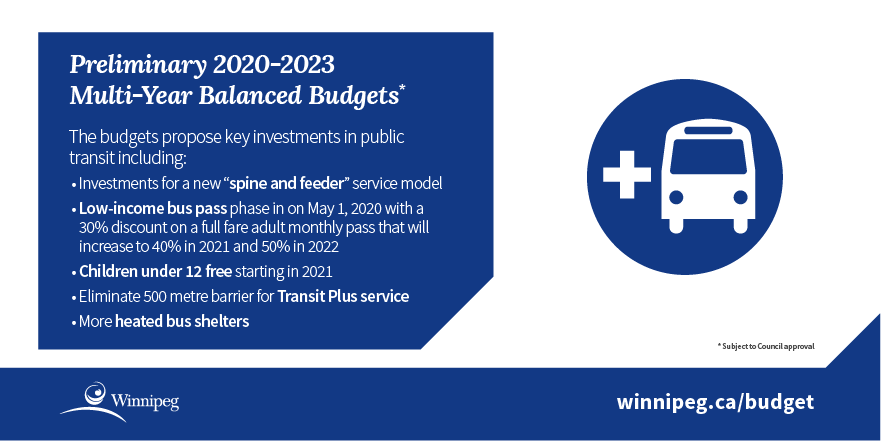
The budgets propose key investments in public transit including:
- Investments for a new "spine and feeder" service model
- Low-income bus pass phase in on May 1, 2020 with a 30% discount on a full fare adult monthly pass that will increase to 40% in 2021 and 50% in 2022
- Children under 12 free starting in 2021
- Eliminate 500 metre barrier for Transit Plus service
- More heated bus shelters
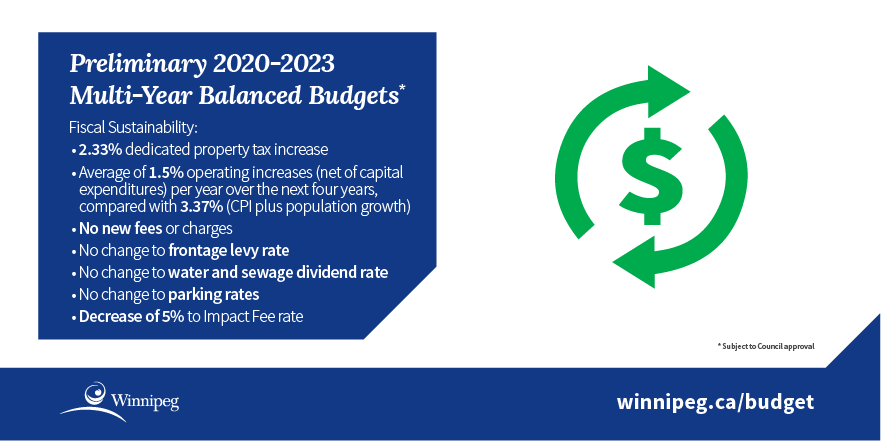
Fiscal Sustainability:
- 2.33% dedicated property tax increase
- Average of 1.5% operating increases (net of capital expenditures) per year over the next four years, compared with 3.37% (Consumer Price Index (CPI) plus population growth)
- No new fees or charges
- No change to frontage levy rate
- No change to water and sewage dividend rate
- No change to parking rates
- Decrease of 5% to Impact Fee rate
Fall 2019 Multi-Year Budget recommendations
- Animal Services Presentation
- Animal Services Feedback
- Assessment and Taxation Presentation
- Assessment and Taxation Feedback
- Audit Presentation
- Audit Feedback
- Community Services Presentation
- Community Services Feedback
- Council Services Presentation
- Council Services Feedback
- Customer Service & Communications Presentation
- Customer Service & Communications Feedback
- Fleet Presentation
- Fleet Feedback
- Golf Presentation
- Golf Feedback
- Innovation, Transformation & Technology Presentation
- Innovation, Transformation & Technology Feedback
- Organizational Support Services Presentation
- Organizational Support Services Feedback
- Planning, Property & Development Presentation
- Planning, Property & Development Feedback
- Planning, Property & Development Presentation (Economic Development Division)
- Planning, Property & Development Feedback (Economic Development Division)
- Planning, Property & Development Presentation (Riverbank Management Division)
- Planning, Property & Development Feedback (Riverbank Management Division)
- Public Works Presentation (excludes Parks & Open Spaces)
- Public Works Feedback (excludes Parks & Open Spaces)
- Public Works Presentation (Parks & Open Spaces Division)
- Public Works Feedback (Parks & Open Spaces Division)
- Water and Waste Presentation
- Water and Waste Feedback
- Winnipeg Fire Paramedic Services Presentation
- Winnipeg Fire Paramedic Services Feedback
- Winnipeg Parking Authority Presentation
- Winnipeg Parking Authority Feedback
- Winnipeg Police Board Presentation
- Winnipeg Police Board Feedback
- Winnipeg Transit Presentation
- Winnipeg Transit Feedback
Budget news
- March 6, 2020 - City of Winnipeg Preliminary 2020-23 Multi-Year Balanced Budgets Tabled
- March 6, 2020 - Road renewal projected to reach a total of $1.4 billion by 2025
- March 6, 2020 - Preliminary 2020-23 multi-year balanced budgets propose spine and feeder investments and free Transit for children under 12
- March 6, 2020 - Preliminary 2020-2023 Multi-Year Balanced Budgets Propose new Fire Paramedic Stations in Waverley West and Windsor Park
- March 6, 2020 - Preliminary 2020-23 Multi-Year Balanced Budgets Build on the Million Tree Challenge with Significant Investments for Protection and Enhancement of our Tree Canopy
- March 6, 2020 - Preliminary 2020-23 Multi-Year Balanced Budgets Provide New Community Safety Investments While Maintaining Historic Funding to the Winnipeg Police Service
- March 6, 2020 - Preliminary 2020-23 Multi-Year Balanced Budgets Ensures Civic Facilities Remain Open
- March 6, 2020 - New Initiative to Drive Transformative Change Included in Preliminary 2020-2023 Multi-Year Balanced Budgets
- February 6, 2020 - Preliminary 2020-2023 City of Winnipeg Multi-Year Balanced Budgets to Be Tabled March 6
- October 18, 2019 - City of Winnipeg Launches Multi-Year Balanced Budget Process
Historical context on the City’s current structural deficit
This fiscal and economic research is intended to support the public service and Council in the preparation of the City of Winnipeg’s first multiyear budget. It provides a historical overview of fiscal and economic trends affecting today’s financial reality of the City of Winnipeg. It is important to examine fiscal policies and tools used in the past because it can help contextualized and inform how to adjust them according to today’s economic reality.
This research should be read in the context of other key City of Winnipeg documents including OurWinnipeg, the State of the Infrastructure Report, the City Asset Management Plan, the Community Trends and Performance Report, as well as the City of Winnipeg Economic, Housing, and Population forecast report.
The City of Winnipeg’s current tax supported operating budget has a structural deficit.
The 2019 adopted budget forecasts a $105 million deficit in 2020, growing to $132 million in 2021. This structural deficit is expected to grow beyond the next two years because projected tax supported operating expenditures continue to grow at approximately twice the rate of projected revenue.
The structural deficit in the City’s tax supported operating budget is not a recent occurrence.
It has developed over a twenty year period.
The decade following 1990 was a challenging one for Winnipeg. Many of the existing fiscal policies in place today for the City of Winnipeg are a reflection of past challenges. Throughout the 1990s, Winnipeg faced significant challenges that included:
- Population decline;
- Historical flooding in 1997;
- Loss of a major sports franchise in 1996;
- Among the highest municipal property taxes in Canada;
- Low revenue growth;
- High debt servicing; and,
- High dependence on property taxes.
In response to these challenges, the City of Winnipeg utilized various fiscal tools to address these and other challenges, and to manage and limit the population and economic decline being experienced at the time. Among the measures undertaken included:
- Property tax reductions and then freezes;
- Restricted capital investment;
- Expenditure reductions;
- Reduced City’s staffing levels;
- Reduced debt; and,
- Increased withdraws from reserve accounts.
Beginning in 2010, the challenges faced by the City of Winnipeg began to change.
While the decade prior the City faced challenges of population decline, the years following 2010 were marked by a significantly different challenge: the challenge of growth.
Since 2010, the City of Winnipeg has experienced:
- The fastest population growth since the 1950s;
- Record economic growth, like in 2018 when Winnipeg recorded the second highest real GDP growth out of all major Canadian cities.
- The lowest property taxes of any major Canadian city;
- Low reliance on property tax as a revenue source; and
- Low debt payments.
During the decade of significant population growth since 2010, complemented by a strong economy, many of the fiscal tools implemented in response to population decline in the 1990s, remained in place.
This has contributed significantly to the City of Winnipeg’s structural deficit. It has contributed to an imbalance between revenues, expenditures, and the cost generated by a growing city.
This fiscal and economic research outlines the historical context in which many of today’s fiscal policies find their origins, and underscores the importance of reviewing such policies to ensure the City of Winnipeg continues on a trajectory of growth while increasing its desirability as a destination for prospective residents and businesses.

